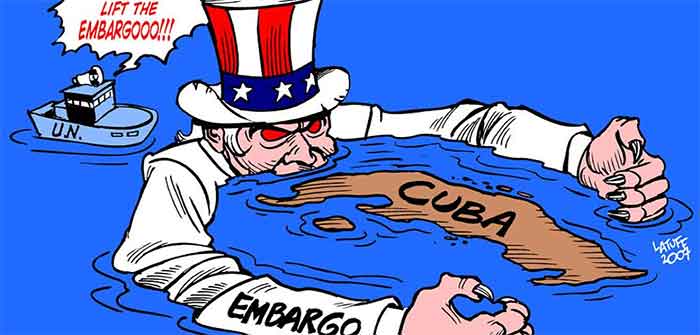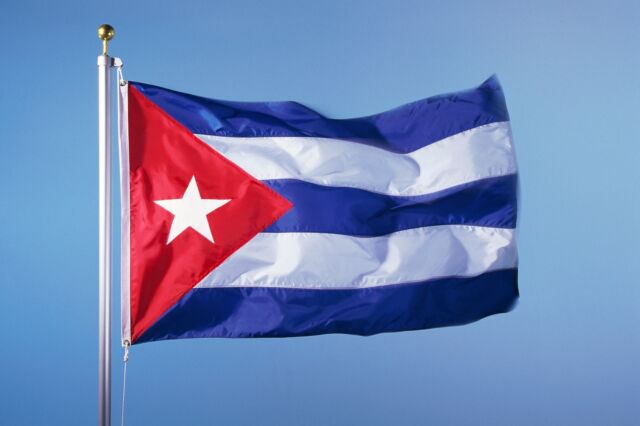
Cuba has been witnessing anti-government protests since July 11, 2021. These demonstrations are fuelled by a number of factors. The devastating knock-on effects of the Covid-19 pandemic on a developing nation like Cuba – a tourism-dependent economy – coupled with the criminal sanctions and blockade against the country have caused real hardship to the Cuban people and their economy. Cuban leaders have taken a transparent approach, speaking honestly to the citizens about these realities.
However, the touts of imperialism have behaved in a repulsively hypocritical manner, trying to exploit Cuba’s externally engineered social crisis for the promotion of a political agenda of interventionism. On July 14, 2021, Miami Mayor Francis Suarez – in an interview with right-wing American television channel Fox News – expressed his desire to bomb Cuba. “What should be contemplated right now is a coalition of potential military action in Cuba”.
“What I’m suggesting is that option is one that has to be explored and cannot be just simply discarded as an option that is not on the table.” “And there’s a variety of ways the military can do it, but that’s something that needs to be discussed, it needs to be looked at as a potential option, in addition to a variety of other options that can be discussed.” The maniacally aggressive attitude of the spokespeople of the American Empire toward Cuba is historically anchored in the dynamics of imperialism.
With the proclamation of a triumphant Cuban Revolution on January 1, 1959, a radical process of social change was inaugurated wherein powerful and influential corporations (such as United Fruit Company and International Telephone and Telegraph Corporation) lost land, influence, and wealth. Unwilling to let go of a profitable neo-colony, USA unleashed its entire apparatus of counter-revolutionary terrorism. It began with sabotage, targeted assassinations of revolutionary leaders, and the infiltration of highly trained killers.
Unscrupulous attempts were made to turn the Cuban populace against their government. Hospitals, retirement homes, schools, and kindergartens were torched, their occupants slaughtered and wounded. Martin B-26 Marauders – equipped with incendiary and phosphorous bombs – were deployed to destroy vegetable, sugarcane, and tobacco plantations and irrigation and industrial facilities. Warlike attacks destabilized Cuba’s coastal ports and fishing boats. Poisons were filled in cigar boxes, time bombs installed in theatres and shops.
When the US was unable to re-subjugate Cuba through direct means, it adopted a new strategy. The Lester Mallory memorandum encouraged the creation of an “inconspicuous” and “adroit” method “which…makes the greatest inroads in denying money and supplies to Cuba, to decrease monetary and real wages, to bring about hunger, desperation and overthrow of government.” While the US blockade of the Cuban economy has failed to destroy the communist government, it has succeeded in making life harder for Cubans.
The adverse consequences of USA’s modern siege warfare have been callously capitalized upon by North American media oligarchies to misrepresent the situation in Cuba. Continual exaggeration (and sometimes fabrication) of Cuban problems, the deliberate erasure or trivialization of Cuba’s achievements, and a de-contextualization of the country’s challenges, are aimed at undermining the alternative development model propagated by the 1959 Revolution. These tactics continue till this day, sustained by an ever-tightening imperialist noose around Cuba.
Starting in June 2017, the administration of Donald Trump proceeded to implement 243 new sanctions to stiffen the embargo. By late 2018, his administration, strongly influenced by the Cuban-American lobby (and especially Florida’s senator Marco Rubio), restored the old restrictions on US citizens’ freedom to travel to Cuba (thereby weakening Cuba’s tourist economy). In April 2019, Trump refused to follow the post-1996 pattern of all US presidents waiving the enactment of Title III of the Helms-Burton legislation.
The impact on the Cuban economy was instant, with a marked fall in US-origin tourism to Cuba, significantly weakening national income and disrupting government plans to sustain the recent growth in tourist numbers, reaching over four million in 2018. The interlinked nature of global banking soon convinced European and Canadian investors to end their activity in Cuba, dissuading external capital from entering the Cuban economy. This affected the capacity of foreign entities to function without the ability to pay any Cuban counterparts.
In spring 2019, Trump additionally ended the 2000 presidential decree to allow US food sales to Cuba on the condition of Cuban prepayment in cash; the move immediately created a shortage of some foodstuffs for most Cuban consumers. He then decreed a series of measures to harden sanctions on third-party vessels and airlines working with Cuba. Finally, and importantly, Trump made it impossible to send remittances, leading to a loss of $3.5 billion annually – a painful blow to more than half of Cuban families.
USA’s economic warfare has gone hand in hand with geopolitical realignments in Latin America. The collapse of oil production in Venezuela – orchestrated by the American Empire – has cut off a source of cheap oil for Cuba. US pressure has led other South American countries to cancel medical contracts with Havana and send Cuban doctors home. All of this led to huge problems in a country which relies on foreign exchange to import 70% of its food, 69% of its oil and many pharmaceutical products.
In spite of external pressures, the Cuban Revolution continues to hold up. The basis for this steady existence is to be found in the deep reserves of grassroots support. While anti-government protests have been numerically small, the counter-protests in support of the socialist administration have numbered in hundreds of thousands. The Cuban Revolution is the incarnation of the Cuban people as a whole and enjoys popular support for its contribution to the struggle for liberation, the defense of sovereignty and independence.
Yanis Iqbal is an independent researcher and freelance writer based in Aligarh, India and can be contacted at [email protected]
Originally published in Internationalmagz.com














































